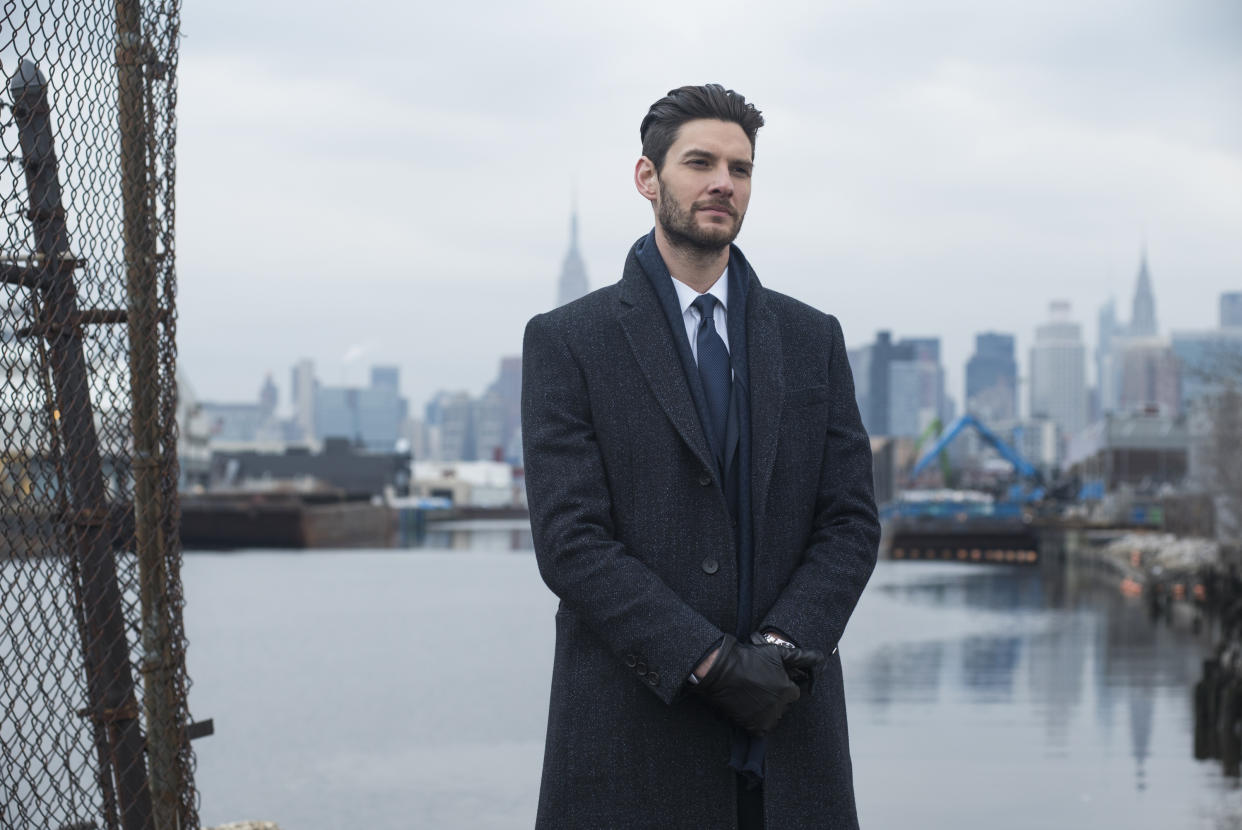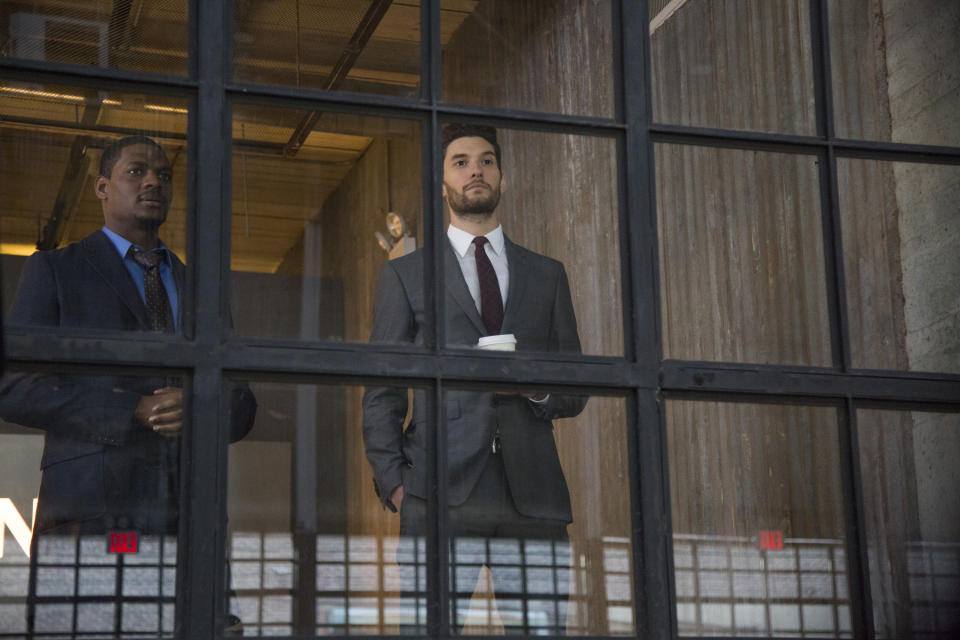Ben Barnes on breaking bad in 'The Punisher'

Warning: This post contains spoilers for the second half of The Punisher‘s first season.
When Ben Barnes accepted the role of Billy Russo on The Punisher — the new Netflix series starring Marvel’s famous gun-toting vigilante, Frank Castle (Jon Bernthal) — he knew that a dark future awaited his character. After all, in the comic book realm, Russo frequently dispenses and endures punishment as the gruesomely scarred villain, Jigsaw. And though the show changed some details about Billy’s origins — making him Frank’s longtime friend rather than his longtime nemesis, for example — his ultimate fate wasn’t likely to be altered. So for Barnes, the question wasn’t “Will Billy break bad?”; it was “When will Billy break bad?” The show’s producers didn’t mind making him wait to find out. “They were fairly clandestine even with me about any sort of twists and turns,” the British actor tells Yahoo Entertainment. “We were shooting Episode 5, and I was thinking to myself, ‘Is there going to be a turn? Is it going to happen?'”
Turns out that Barnes had to wait only one more episode. At the end of the sixth hour, “The Judas Contract,” Billy emerges as one more member in the conspiracy that odd-couple allies Frank and Micro (Ebon Moss-Bachrach) are working to unwind. That revelation sets the two on a collision course that ends with Frank essentially creating the man who will become Jigsaw.
We spoke with Barnes about the scene that reveals Billy’s true nature, and why his memorable role as Logan on Westworld made him a better bad guy.
Yahoo Entertainment: Were you excited to play the moment where it’s revealed that Billy has been part of the conspiracy against Frank all along?
Ben Barnes: We did a read-through of each episode before we started filming them, and I remember the read-through for “The Judas Contract” very specifically. Our showrunner, Steve Lightfoot, was there, and so were some of the executives from Marvel and Netflix. We finish reading the episode, and there’s the reveal of who Billy’s in league with. I remember Steve going, “Billy Russo, you dirty, dirty boy.” I just looked at him and went, “You wrote it!” [Laughs] They were quite excited about that turn because after that point, Frank Castle is battling the powers that be in a more general way, as well as his inner demons and stuff. So it’s nice to get a little bit more specific about it. The truth is that there’s not really any kind of a traditional big bad [guy] in the comic book sense in this particular series. It’s an origin story for both of the characters in a way. While they’re at odds by the end of the series, they haven’t become each other’s nemeses yet.
Once the reveal happened, I wanted to go back and rewatch Billy’s scenes up to that point to see how that reveal was teased in your performance.
Obviously, I did know it was coming, and I was asking all sorts of questions about my involvement in things, but they wouldn’t tell me exactly what they had planned for the future. I would want to know what my involvement had been in Frank’s past — I needed to be up to date on that stuff at least. So when I’m playing my game of cat-and-mouse with Dinah Mandi [played by Amber Rose Revah], I could sort of pick and choose as an actor what moments are feeling a little more genuine or whether he’s a ruthless liar through and through. I thought it was interesting to see for the first time in a Marvel series such a slow burn in terms of character. You genuinely don’t know what side this person is on.
What sort of discussions did you have with Jon Bernthal about how much Frank knows, or suspects he knows, about Billy?
We had a lot of discussions about their pasts, and we actually shot some scenes that may be being saved for any future seasons that might come about. There was exploration of their history as friends, and we see them together as partners and as “Uncle Bill” in terms of his relationship to Frank’s family. In a lot of these universes, the “villain” has done something that’s wronged the hero in such a way that can never be forgiven, but in Billy’s case, a lot of the other characters have done much worse things in terms of organizing the massacre of his family or trying to keep him at bay. I think that Billy’s betrayal is only keeping information from him, which in the grand scheme of the Marvel universe is not the worst crime that’s ever been perpetrated. However, because of their closeness and their brotherhood, it seems so much more.

And for my money, Billy is actually kind of broken from when he’s a boy, so Frank is the one man he has respect for. He sees something of himself in him, and I think that’s what makes the betrayal sting for Billy too. Because when you’re playing these characters with such different shades of morality, it’s important in portraying that character to believe everything I’m doing is absolutely on the level. I actually feel a bit sorry for Billy in certain circumstances. What he’s doing is out of self-preservation and love, and it might be for the wrong, but I wanted to play it that he cares very deeply about Frank. I don’t think the story really works unless Frank holds a special place in Billy’s life.
In a sense Billy is already broken, so his final transformation into Jigsaw — when Frank slices his former friend’s face on glass — is a case where he finally looks on the outside the way he does on the inside.
Yeah, absolutely. I sort of saw it in stages, like a game of Jenga. Billy was essentially orphaned and abused as a child, and that’s corrupted him a certain way. But from being in the military, he’s built up this kind of incredible mask, which is based on the way he looks, the way he dresses, and the way he treats women. It’s all this giant mask, so the idea of the shattering of that mask is the final thing in terms of losing how he sees himself. That’s part of the idea of using mirrors in our version — as this cautionary tale of narcissism. And that’s stacked up against the idea that he could have brain damage in some way, which they mention in the last episode. I have no idea what they’re going to give in terms of how the Jigsaw character will be revealed, but I certainly have my ideas about how it could work, and how he could be a more traditionally threatening figure in the Marvel universe.
How important was your role on Westworld in terms of transitioning from the heroes you played early on in your career to the more villainous roles you’re playing now? It looks like you’re really enjoying being bad.
It certainly helped prepare me in terms of the boldness of my choices. Earlier on in my career, I felt like if any accusations were leveled at me, it was that my performances were a bit traditional and what people were used to. So I made a decision that I’m just going to be a bit braver, and I think that Westworld allowed me the opportunity to do that — to really kind of stretch my legs in terms of mischief. Obviously, the two characters are very different; Logan is more of a pain in everyone’s neck. One thing I asked is that he never say something that wasn’t true. There was one line where he had to [lie], and I told [the writers], “It’s really important to me that Logan never lies.” He’s weirdly a bit of a moral compass for the real world, I think. Of course, I have to be on his side because I have to play him! But yeah, I did want to take some of that momentum through to The Punisher and be a little more broken and evil and malicious. I’m having fun pushing where that can go.
Will Logan be back in Westworld‘s second season?
I am back a little bit in the second season, which is not something I necessarily expected! But I am back, and I will say that everything that I’ve encountered so far is different. I have not read full scripts or anything, but it’s certainly flipped me upside down in terms of what I was expecting from the series. No one’s going to be disappointed in terms of it pushing the envelope!
Season 1 of The Punisher is currently streaming on Netflix.
Read more from Yahoo Entertainment:

